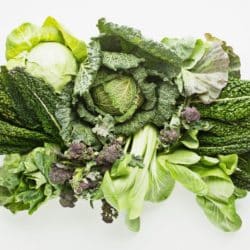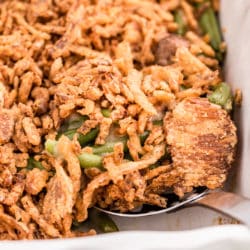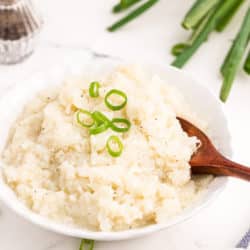20+ Vegetables that Start with H (With Photos!)
Here’s a list of the vegetables that start with the letter H. Whether you need this list for a word game or for shopping inspiration, you’ll find everything you need. This list covers them all.

Vegetables That Start with H (Short List)
- 1. Habanero pepper
- 2. Habek mint
- 3. Hamburg parlsey
- 4. Haricot beans
- 5. Hass Avocado
- 6. Heart Pea
- 7. Hearts of Palm
- 8. Heirloom Tomatoes
- 9. Hijiki
- 10. Hispi Cabbage
- 11. Hokkaido Squash
- 12. Hongo Mushroom
- 13. Hops
- 14. Horse Bean
- 15. Horse Gram
- 16. Horseradish
- 17. Hot Biscuits Amaranth
- 18. Hungarian black pepper
- 19. Hungarian wax pepper
- 20. Hyacinth bean
Vegetables That Start with H (Full List)
Here is a comprehensive list of vegetables that start with the letter H.
From heart of palm to hot peppers, you can use this list for your next shopping trip or word game.
1. Habanero Pepper
A habanero pepper is a type of chili pepper. The habanero chili is native to the Amazonas region of South America. The pepper is small, green, or orange and has a pointed end.
The habanero chili has a fruity, citrusy flavor with a hint of sweetness. Peppers are also a great source of vitamin C.

2. Habek mint
A Habek mint is a type of mint that is native to the Mediterranean region. The plant has small, purple flowers and narrow, green leaves. The leaves are often used to flavor tea, salads, and other dishes.
Habek mint has a slightly bitter taste with a cooling aftertaste.
3. Hamburg Parlsey
Hamburg parsley is a variety of parsley that is grown in Hamburg, Germany. Hamburg parsley has a mild taste that is similar to that of regular parsley.
It can be used fresh or dried, and it is often used as a garnish or seasoning.
4. Haricot Beans
Haricot beans are a type of common bean that is native to Central America and South America.
The beans are small, white, and kidney-shaped (see photo below). They have a mild flavor and are often used in soups and stews.

5. Hass Avocado
Hass avocado is a type of avocado with dark green or black skin. It is usually grown in California, Mexico, and Peru. It’s often considered a vegetable, but it’s technically a fruit.
The Hass Avocado has a pear-shaped body with a rough, bumpy surface. The flesh is creamy and yellowish in color with a nutty flavor.
Avocados are a good spruce of fiber and they taste great! I even use them to make avocado ice cream.
6. Heart Pea
Heart Pea is a small, heart-shaped legume that is native to South America.
It is typically green or brown in color and has a nutty flavor. Heart Pea is often used in soups and stews, as well as rice and bean dishes.
7. Hearts of Palm
Hearts of palm, also known by its scientific name Palmito, is a vegetable that is harvested from the inner core of certain palm trees. It has a long, white, cylindrical shape and a slightly nutty flavor.
Hearts of palm are typically used in salads or as a garnish, but they can also be cooked and served as a side dish. You can also buy low-carb pasta made from this veggie.
It’s a good source of fiber.

8. Heirloom Tomatoes
Heirloom tomatoes are usually grown from seeds that have been passed down from generation to generation and are grown in many different places around the world. They have a distinct flavor that is different from other types of tomatoes.
Heirloom tomatoes are typically red or yellow, and they can vary in size. Some heirloom tomatoes can be as small as a grape, while others can be as large as a cantaloupe.
You’ll find heirloom tomatoes in different colors and some have a sweet flavor. Tomatoes are also technically considered a fruit, but most people consider them a vegetable so I’ve included them on this list.
9. Hijiki
Hijiki is an edible seaweed that is most commonly found in the waters off of Japan. It has a long, thin black appearance and a slightly sweet taste.
When cooked, it has a chewy texture similar to that of al dente pasta. Hijiki is often used in Japanese cuisine, either as an ingredient in salads or as a side dish.
Sea vegetables in general have a high nutritional value including being a good source of iodine and other essential vitamins.
10. Hispi Cabbage
A Hispi cabbage is a type of cabbage that is grown in the United Kingdom.
Hispi cabbages are small, dense, and have a sweet, nutty flavor. They can be eaten raw or cooked. When cooked, they become tender and can be used in a variety of dishes, such as stir-fries, soups, and stews.

11. Hokkaido Squash
A Hokkaido squash is a variety of winter squash that is native to Japan. The squash has a dark green or orange skin and a white flesh.
It is small in size, with a diameter of only 10-15 cm. The taste of the squash is sweet and nutty.
12. Hongo Mushroom
A Hongo mushroom is a type of fungus that is typically found in subtropical and tropical regions. It often grows on the underside of tree bark or on fallen logs.
The Hongo mushroom has a brown or black cap with white spots and a long stem. It has a slightly bitter taste.
13. Hops
Hops (Humulus lupulus) is a plant that is used in brewing beer. It is also used in herbal medicine for medicinal properties such as managing blood pressure and heart health.
The female flowers of the plant are used to add bitterness, flavor, and aroma to beer. The hop plant is native to Europe, Asia, and North America.

14. Horse Bean
Horse beans are a type of legume that is native to parts of Asia, Africa, and Europe. The beans are large and kidney-shaped, and they have a dark brown or black color.
When cooked, horse beans have a firm texture and a nutty flavor.
15. Horse Gram
A Horse Gram is a bean that is grown in India and Pakistan. It is a small, dark brown or black bean that has a strong, earthy flavor. When cooked, it has a chewy texture.
Horse Gram can be used in soups, curries, and dals.
16. Horseradish
Horseradish is a root vegetable that is grown in Europe, Asia, and North America. T
he plant looks like a small tree or bush, and the root is white with a brownish-red skin and it has a strong, pungent flavor (some people may describe it as a sour taste).
When grated or chopped, horseradish can be used as a condiment or spice, especially for foods like roast beef or prime rib.

17. Hot Biscuits Amaranth
Amaranth is a plant that is native to South America, but it is also grown in other parts of the world.
The plant has small, green flowers, and the seeds of the plant are used to make flour. The flour is then used to make a type of bread called “hot biscuits.”
Hot biscuits are a popular food in parts of South America and they are made by frying flour in oil or fat.
18. Hungarian black pepper
The Hungarian black pepper is a type of pepper that is native to Hungary. It is a small, round pepper that is approximately 1-2 cm in diameter and has a black or brownish-black color.
The taste of the Hungarian black pepper is hot, pungent, and slightly fruity.
19. Hungarian wax pepper
A Hungarian wax pepper is a type of chili pepper that is grown in Hungary.
It is small and thin, with a smooth, waxy texture. The peppers have a mild to medium heat, with a sweet and slightly fruity flavor.
Hungarian wax peppers are used in many traditional dishes, such as goulash and paprikash.

20. Hyacinth bean
The Hyacinth bean is a legume that is native to Africa and is a popular food crop in many parts of the world.
The beans are green or purple in color and have a kidney-shaped appearance. They are often used in soups and stews, as well as in salads and side dishes. The beans have a nutty flavor and a firm texture.
Bonus list
You may be wondering if there is a list of fruit starting with h. Some of these include hardy kiwi fruit, honeydew melon, Honeycrisp apple, and Himalayan mulberry. Let me know if you’d like to see a complete list!
Summary
These vegetables starting with the letter H come from all over the world, and each one has its own distinct flavor. Whether you’re looking for a new food to try, or just want to learn more about the foods we eat, these different vegetables are sure to interest you. Who knows, you may even find your new favorite food!
Don’t Miss These Vegetable Lists!
Don’t forget to join my newsletter list to get exclusive clean eating recipes and tips. The newsletter is 100% free with no spam; unsubscribe anytime.
About the Author: Carrie Forrest has a master’s degree in public health with a specialty in nutrition and is studying to be a holistic nutritionist. She is a top wellness and food blogger with over 5 million annual visitors to her site. Carrie has an incredible story of recovery from chronic illness and is passionate about helping other women transform their health. Send her a message through her contact form.




















